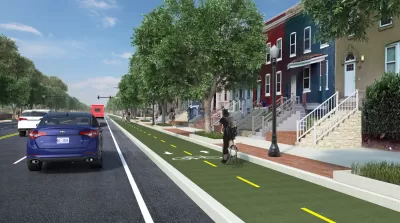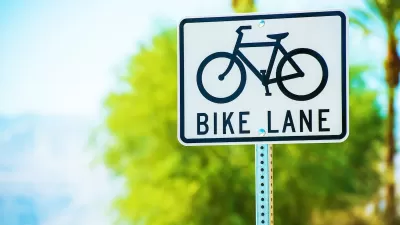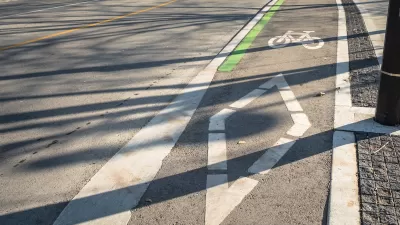The District of Columbia plans to install ten miles of protected bike lanes this year, among other improvements including additional bike parking and more e-bikes for the Capital Bikeshare fleet.

Washington, D.C. plans to add 10 miles of protected bike lanes to its current. 24-mile network, reports Luz Lazo. The District plans to install 30 total miles over the next three years. "Building bike infrastructure has been challenging for the District, where space is tight on many roadways and replacing parking or general traffic lanes has not been an easy sell. Some advocates have complained that the city has moved too slowly toward reaching its goals."
Lazo interviews George Branyan, manager of active transportation at DDOT, to understand the District's strategy for improving bike infrastructure and making biking more appealing to more residents. According to Branyan, during the pandemic, "There was a definite shift in patterns where we had not nearly as much of the commute-to-work peaks in the morning and the evening. But there were a lot of people who were biking at other times of day and on the weekends. A lot of people use the bike lanes just spread out over more time, and we also saw increases in trail use."
Branyan describes planned bike projects, including three miles of bike trails east of the Anacostia River, 2,500 new electric bikes in the District's bike share fleet, and 1,000 new bike racks across the District.
FULL STORY: D.C. wants to double its 24 miles of protected bike lanes. It plans to start with 10 miles this year.

Alabama: Trump Terminates Settlements for Black Communities Harmed By Raw Sewage
Trump deemed the landmark civil rights agreement “illegal DEI and environmental justice policy.”

Planetizen Federal Action Tracker
A weekly monitor of how Trump’s orders and actions are impacting planners and planning in America.

How Atlanta Built 7,000 Housing Units in 3 Years
The city’s comprehensive, neighborhood-focused housing strategy focuses on identifying properties and land that can be repurposed for housing and encouraging development in underserved neighborhoods.

Report: Zoning Reforms Should Complement Nashville’s Ambitious Transit Plan
Without reform, restrictive zoning codes will limit the impact of the city’s planned transit expansion and could exclude some of the residents who depend on transit the most.

Judge Orders Release of Frozen IRA, IIJA Funding
The decision is a victory for environmental groups who charged that freezing funds for critical infrastructure and disaster response programs caused “real and irreparable harm” to communities.

‘Clybourne Park’ Sets Stage for Housing Equity Discussions
Clybourne Park, a play exploring race, real estate, and community tensions, can set the stage for discussion on the lasting impacts of housing discrimination, gentrification, and the fight for affordability.
Urban Design for Planners 1: Software Tools
This six-course series explores essential urban design concepts using open source software and equips planners with the tools they need to participate fully in the urban design process.
Planning for Universal Design
Learn the tools for implementing Universal Design in planning regulations.
Caltrans
Smith Gee Studio
Institute for Housing and Urban Development Studies (IHS)
City of Grandview
Harvard GSD Executive Education
Toledo-Lucas County Plan Commissions
Salt Lake City
NYU Wagner Graduate School of Public Service




























